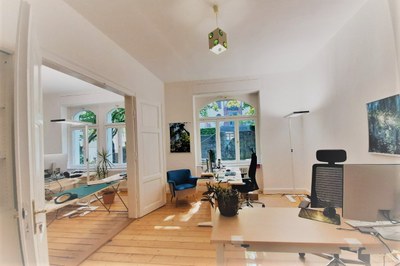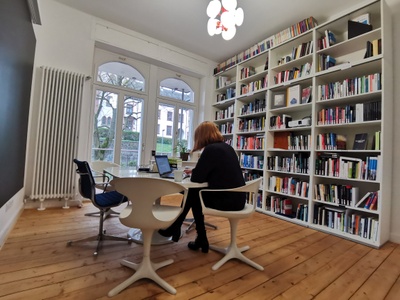Call Fellowship 2025
Call for Applications 2025
Planetary Scholars & Artists in Residence Program
PROTOTYPING A PLANETARY DEMOCRACY
Eight Fellowships on Planetary Agency & Politics
Click here to download a PDF Version of the Call
In political responses to anthropogenic planetary distress, the core principle of freedom no longer seems to be a priority. As the Earth’s critical biophysical systems are growing increasingly fragile, approaching collapse, the bases for the livelihoods of millions of people and more-than-human beings are under threat. Equipped with reformative control mechanisms dating back to the onset of the environmental movement (e.g., the sustainability paradigm or the IPCC), democratic systems have failed to avert the present polycrisis. Instead, fossil-fueled, extractive ways of living off — as opposed to with— the planet continue to prevail while ecosystems collapse, species go extinct, and geopolitical conflicts abound. In the meantime, democracies have transformed from proactive into reactive forces. Unexpressive of the collective “will” of other than human political agents, nation-state- and human-centered governments remain incapable of coordinating collective action to keep the Earth habitable. However, the freedom of all humans, including future generations, is inextricably linked to the vibrancy of the biosphere; the struggle for civil rights and the struggle for the planet are one. To preserve democratic values and avoid dictatorship in answer to the planetary crisis, political institutions need to recalibrate towards the earthly multitudes that shape the condition of our lives.

|
The Panel on Planetary Thinking at the Justus-Liebig-Universität (JLU) in Giessen, Germany, seeks scholars and artists with visions of designing these future institutions. For the periods April-June and September-November 2025, we award eight fellowships for scientific and creative projects that conceptualize and experiment with strategies to integrate more-than-human agencies into politics. To restore the proactive capacity of democratic systems to foster freedom, equality, and solidarity, all “voices” that pose demands to and are affected by their decisions must participate. Democratic thinkers consider these to include not only the perspectives and intelligences of more-than-human life but also those of ecosystems, ecoregions, and planetary forces, as well as the ones provided by the emergent technosphere or (in)animate matter. However, concrete plans are missing for realizing this political practice or differentiating between the collectives and individuals within this unwieldy crowd. To contribute to closing this gap, we need insights on (1) how PLANETARY AGENCY manifests and (2) how PLANETARY POLITICS can answer to more-than-human political agency. As a result of this final round of our consecutive, four-year fellowship program, we aim to design a planetary democracy prototype.
Planetary Thinking on Agency & Politics
We do not simply live ‘on,’ but are part of an ever-changing planet—alongside a multitude of others. To grapple with what that means and how we can meet our human responsibilities, the Planetary Scholars & Artists in Residence Program (2022-2025) facilitates dialogues between the humanities, social sciences, natural sciences, life sciences, and the arts. The program’s overarching questions touch upon the following dimensions:
- In terms of the past: How did planetary forces form us? How did we obtain planetary forces that are capable of transforming Earth?
- Concerning the present: How can humans deal with irregular-regular planetary changes beyond their influence? What does it mean to have such powers, how should they be deployed, and when should they be restrained?
- And prospectively: Which planetary forces beyond our influence can we anticipate? Which planetary dynamics can we ally or reunite with, and which alliances should we quit (if possible)?
Currently, the third group of fellows is working on the overarching theme of PLANETARY TIMES ‐ their projects address the planetary evolution in information processing, comparative planetary histories, the practice and philosophy of de-extinction, as well as planetary timescales and the conception of eternity investigated through case studies on glaciers, permafrost tunnels, and cryopreservation facilities. Previous fellows have investigated two other theoretical premises of planetary thinking: PLANETARY MATERIALS (2022) and PLANETARY SPACES (2023). In this final round, we wish to bundle creative and scientific potentials to apply this planetary lens while conceptualizing and designing the building blocks needed for a planetary democracy (PLANETARY AGENCY and PLANETARY POLITICS, 2025). Applicants may focus on increasing our understanding of more-than-human agencies by rendering them visible, tangible, and interpretable through political terms. From there, we wish to reflect on and experiment with the respective institutional structures and democratic practices that enable these agents’ political inclusion. Therefore, applications may focus on either PLANETARY AGENCY or PLANETARY POLITICS or address both dimensions complementarily. Applicants should aim to generate insights that enhance the current state of research and practice outlined in this Call, and they are welcome to apply for both terms if their projects require more than one period to be realized.
Projects seeking insights into the implications we can draw from PLANETARY AGENCY on the institution building of a planetary democracy include, but are not limited to:
- The (co-)shaping of the Earth, other planets, ecosystems, and human societies by
→physical, planetary, or cosmic forces (e.g., the impacts of gravity and seismic forces on architectural design, the structuring of societies by bodies of water, or the geopolitical consequences of solar storms);
→microbial, fungal, vegetal, and nonhuman animal life (e.g., the terraforming capacities of bacteria, the information exchange in forest ecosystems via mycorrhizal networks humans draw upon, or the co-shaping of societal life between humans and domestic animals);
→technological or “artificial” life (e.g., the social and political impacts of Large Language Models and other AI technologies, as in oil extraction or conservation efforts, or the use of robotics in research, therapy, or space exploration);
- Research on more-than-human communication (e.g., plant bioacoustics utilizing digital technologies, biomimetic robots, and supported by artificial intelligences).
Projects focusing on PLANETARY POLITICS should aim to design the building blocks for a planetary democracy prototype. Possible foci include, but are not limited to:
- Concrete proposals for new institutional frameworks, practices, and spaces that enable this new institution to answer to more-than-human agencies (e.g., more-than-human voting practice, constituencies, or parliaments);
- Visionary expansions of political concepts, theories, and real-world experiments that
→recognize and answer to more-than-human political agents (e.g., more-than-human rights, interspecies democracy, multispecies justice, or planetary commons);
→aim for safeguarding planetary habitability (e.g., Earth System Governance, planetary federalism, or ecological democracy);
→practice more-than-human collaboration, inspiring more-than-human politics (e.g., Animals in the Room, Organisms Democracy, the Embassy of the North Sea, Terra0, The Internet of Animals, or The Internet of Trees);
- Research and experiments exploring the inspirations we can draw from the political dimensions inherent to planetary agencies (e.g., efforts in more-than-human translation, engagement with democratic arrangements of insects or herd animals, or more-than-human forms of protest or preferences).
Fellowship Awards & Expectations

All fellows are expected to reside in Giessen (or its proximity) throughout the period(s) of their fellowships. They will be granted a stipend of 5,000 euros/month, which is supposed to cover all travel and living expenses. In addition, funding for workshops, guest speakers, exhibitions, publications, etc., is available upon request. During their residency in Giessen, fellows will be fully integrated into the JLU’s academic life, have full access to its libraries, and may be put in touch with researchers from its comprehensive range of research facilities. The Panel also maintains a range of cooperations with other organizations, ranging from Giessen’s theater to its cinema and makerspace. All fellows are expected to participate in the regular panel meetings and to design an engaging workshop with and for a transdisciplinary audience in collaboration with their co-fellows. Depending on their individual scholarly and/or artistic subject matters, they may conceptualize the workshops in a format they choose, such as a masterclass, an exhibition, or a performative activity.
Comfortable apartments with fully equipped kitchens have been reserved in the university’s ‘Alexander von Humboldt’ guest house, but fellows are welcome to take up residence elsewhere according to their preferences. They are provided with newly renovated and furnished co-working/studio spaces at the Panel on Planetary Thinking’s headquarters within the city center ― inside one of Giessen’s most characteristic, old-style buildings. 
Please do not hesitate to contact us with any specific requests. As we work closely with the JLU’s international office, future fellows will receive adequate support on any formalities connected to their stay in Giessen (e.g., questions about health insurance or residence permits).
Requirements and Application Procedure

→ fellows should have an advanced academic or artistic record relevant to Planetary Agency, -Politics, or democratic theory; as we prioritize the respective project's relevance for our theme as against academic degrees, holding a PhD is not a prerequisite;
→ fellows have to commit to taking up residence in or in the proximity of Giessen during the period they apply for;
→ fellows are obligated to (co-)organize one workshop that may include an exhibition or a performative activity;
→ artists interested in contributing to the final exhibition should be available for remote coordination from October 2024 onwards;
→ fellows should be willing to participate actively in the activities outlined above.
Please send the application (in English) as a single pdf-file and include the following:
- Cover letter (one page max.) stating your motivation to apply;
- Curriculum vitae
- artist portfolio on works connected to planetary thinking (for artists); which may include a suggested work for the exhibition (one-page max.);
- project description that outlines your planned contribution to building the planetary democracy prototype (for both scholars & artists);
- tentative abstract for a workshop or event of an alternative format (one page max.);
- An outline of any specific requests (materials/equipment needed or individual requirements regarding furnishing office spaces/studios, etc.)
Please also note that:
The title of your PDF should reflect the period(s) you are available for and your thematic focus:
“LastName_Summer/Winter_Agency/Politics,”
“LastName_Summer/Winter_Politics,”
“LastName_Winter_AgencyPolitics,”
“LastName_SummerWinter_Politics,” or other constellations.
Applicants are welcome to apply individually or as transdisciplinary pairs (artist and scholar) with a clearly defined project in mind to which they will dedicate their fellowship. Please note that two individual CVs are required for joint applications, and your personal ideas and perspectives on your collaborative project should be clearly outlined.
The deadline for applications is July 24, 2024. Applications must be sent via email to panel. Shortlisted applicants may be invited for online interviews in late August/early September 2024. Decisions will be announced shortly after.
For more information, consult us via email.
We are very much looking forward to reading your applications!
